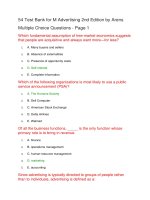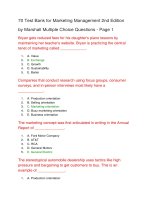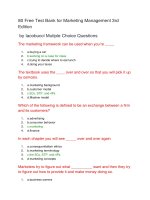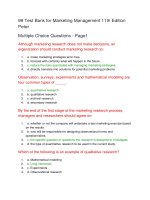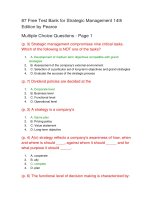88 test bank for marketing management 2nd edition by marshall
Bạn đang xem bản rút gọn của tài liệu. Xem và tải ngay bản đầy đủ của tài liệu tại đây (124.29 KB, 25 trang )
88 Test Bank for Marketing Management 2nd Edition
by Marshall
True - False Questions
Direct-to-consumer marketing by pharmaceutical companies and the vast
amount of health information available to patients on websites enable
them to self-diagnose and self-prescribe and saves the physician time.
The trend toward more information in the hands of the customer is
diminishing.
1.
True
2.
False
Strategic marketing refers to deciding which media, distribution, or
pricing tactics to use.
1.
True
2.
False
Even with great marketing, vast numbers of potential customers have
never heard of some products or services. Some people think that
marketing is all about advertising, pushy salespeople, celebrity
spokespeople, spam e-mail, and overstated product claims.
1.
True
2.
False
Marketing is relevant only to people in the organization that work directly
in the marketing department.
1.
True
2.
False
Practicing marketers pitch marketing as an investment, not an expense,
so using marketing metrics is important.
1.
True
2.
False
Big M marketing refers to the strategic, long-term, firm-level commitment
to investing in marketing.
1.
True
2.
False
Dell Computers employs one-to-one marketing by allowing a customer
essentially to customize the product features that he or she desires. When
Henry Ford said "People can have the Model T in any color—so long that
it's black," he was reflecting a selling focus.
1.
True
2.
False
Firms today are beginning to understand the importance of marketing
metrics to assess marketing performance. They are aligning all internal
organization processes and systems around the customer—from IT to
billing to telecommunications.
1.
True
2.
False
Little m marketing refers to tactics and programs the firm uses to reach its
stakeholders.
1.
True
2.
False
Strategic marketing refers to the understanding of markets, competitors,
and other external forces as well as internal capabilities.
1.
True
2.
False
Don Peppers and Martha Rogers popularized the term one-to-one
marketing. Some firms come close to one-to-one marketing by combining
flexible manufacturing with flexible marketing to enhance customer
choices.
1.
True
2.
False
A firm with a production orientation assumes that "if you build it, they will
come." Value and exchange are not considered to be core marketing
concepts.
1.
True
2.
False
Firms today have learned to be open about products and services with
consumers who have endless sources of information, including blogs,
chat rooms, and independent websites.
1.
True
2.
False
Gen Yers tends to value relationships with marketers like State Farm
Insurance in exactly the same way their parents do.
1.
True
2.
False
Of all the business fields, marketing is most visible to people outside the
organization. Peter Drucker stated that since it is the customer who
defines value, the business enterprise has only two business functions:
marketing and innovation.
1.
True
2.
False
It is important that everyone in the organization understand the concept of
customer orientation. After all, every employee has an internal customer.
1.
True
2.
False
Customer orientation and market orientation are opposing concepts.
Customer-oriented firms look at customers as individuals and marketoriented firms look at the market as a whole. Relationship-oriented firms
focus on short-term profitability.
1.
True
2.
False
Fred Wiersema's book The New Market Leaders states that marketers will
continue to have more power than customers in both B2B and B2C
markets.
1.
True
2.
False
Sustainability refers to practices of socially responsible firms that
incorporate doing well by doing good.
1.
True
2.
False
Multiple Choice Questions - Page 1
Companies that conduct research using focus groups, consumer surveys,
and in-person interviews most likely have a ____________.
1.
A. Production orientation
2.
B. Selling orientation
3.
C. Marketing orientation
4.
D. Buzz marketing orientation
5.
E. Business orientation
The marketing concept was introduced ______________.
1.
A. After the Civil War
2.
B. After World War I
3.
C. After the Great Depression
4.
D. In the 1950s
5.
E. In the 1960s
After a recent 141-day strike, the union members in California went back
to work at area grocery stores. The union negotiated raises, better health
care benefits, and a one-tier pay scale. The role of the union may best be
described as a(n) ________.
1.
A. Governmental body
2.
B. Stakeholder
3.
C. Vendor
4.
D. Internal customer
5.
E. Management group
Peter Drucker, the father of modern management, believed that marketing
_____________.
1.
A. Should be a separate function within the business
2.
B. Is the business as seen from an internal point of view
3.
C. Is the business as seen from the customer's point of view
4.
D. Is so basic that it is a central dimension of the entire business
5.
E. Should improve the quality of life for society
The marketing concept was first articulated in writing in the Annual Report
of ______________.
1.
A. Ford Motor Company
2.
B. AT&T
3.
C. RCA
4.
D. General Motors
5.
E. General Electric
Creating, communicating, delivering, and exchanging offerings that have
value may be thought of as ___________________.
1.
A. The marketing mix, or 4Ps
2.
B. The firm's strategic plan
3.
C. Sales orientation
4.
D. Production orientation
5.
E. Exchange
Peter Drucker, the father of modern management, stated that the only
purpose of an organization is _____________.
1.
A. To create products
2.
B. To make products affordable and accessible to the majority of the public
3.
C. To improve the quality of life for all people
4.
D. To create a customer
5.
E. To respect the environment
Creating value focuses on _____________________.
1.
A. Product development
2.
B. Branding and positioning
3.
C. Attention to service
4.
D. Pricing
5.
E. All of these
Bryan gets reduced fees for his daughter's piano lessons by maintaining
her teacher's website. Bryan is practicing the central tenet of marketing
called ____________.
1.
A. Value
2.
B. Exchange
3.
C. Growth
4.
D. Sustainability
5.
E. Barter
The _____________ aspect of a firm is generally the most visible to people
outside the organization.
1.
A. Financial management
2.
B. Accounting
3.
C. Marketing
4.
D. Information technology
5.
E. Operations management
The Clean-O company makes an all-purpose cleaner for the hospital and
nursing home market that is guaranteed to kill 99 percent of
Staphylococcus germs, a major concern for medical facilities. The
company is not interested in pursuing the consumer market. Clean-O has
adopted a ___________.
1.
A. Market orientation
2.
B. Mass customization orientation
3.
C. Differentiation orientation
4.
D. Relationship orientation
5.
E. Product orientation
Studying marketing today is relevant to any business student because
_____.
1.
A. It has much to offer anyone whether or not marketing is in a job title
2.
B. It will enhance a person's effectiveness as a leader
3.
C. It will impact the performance of a work group
4.
D. Mastering marketing is useful for anyone
5.
E. All of these
A medieval knight could not go to the armor maker and pick out a size 44
Long suit of armor to protect him in battle. Nor could a person go to the
cobbler and get a pair of shoes in a few minutes. This period before the
advent of marketing is known as the _______________.
1.
A. Industrial revolution
2.
B. Mass production era
3.
C. Dark Ages
4.
D. Pre-industrial revolution
5.
E. Sales orientation era
AMA's current official definition of marketing reflects the view toward
marketing activities as ______.
1.
2.
3.
A. Focused on strategy
B. Focused on tactics like using electronic commerce and new media like
YouTube
C. Focused on relationships with suppliers and customers
4.
D. Focused on value through creating, communicating, delivering, and exchanging
offerings that have value
5.
E. Both focused on strategy and focused on value through creating,
communicating, delivering, and exchanging offerings that have value
When you tell someone you are a marketing major in college, he or she
may think you want a career in ________________.
1.
A. Management
2.
B. Information technology
3.
C. Sales
4.
D. Customer service
5.
E. Financial planning.
Making a change in any of the marketing mix elements will
_______________.
1.
A. Leave the other elements unchanged
2.
B. Possibly have an impact on another element
3.
C. Have a domino effect on the other elements
4.
D. Require the firm to introduce new products
5.
E. Require an increase in promotion
In 2012, product endorsements earned a professional golfer $78 million, a
top football quarterback $49 million, and a pro basketball player $62
million. This illustrates why many people think of marketing as primarily
about ______________.
1.
A. Adding costs to products
2.
B. Overstating claims
3.
C. Advertising
4.
D. Pushy salespeople
5.
E. Celebrities sponsoring the best products
When JCPenney department store (JCP) changed its _________________
strategy, it discovered that customers did not like it and left.
1.
A. Pricing
2.
B. Promotion
3.
C. Distribution
4.
D. Product
5.
E. Customer satisfaction
The concept of exchange relates to _____________.
1.
A. Monetary price
2.
B. The hassle factor involved in making a choice
3.
C. Skill or intellectual capital
4.
D. Time used in shopping
5.
E. All of these
According to Peter Drucker, the father of modern management, the
business enterprise has only two functions: ______ and _____.
1.
A. Sales; service
2.
B. New product development; sales
3.
C. Marketing; innovation
4.
D. Management; marketing
5.
E. Sales; innovation
High pressure selling _____________.
1.
A. Is practiced today by many companies
2.
B. Has a marketing orientation
3.
C. Sparked laws to protect consumers
4.
5.
D. Both is practiced today by many companies and sparked laws to protect
consumers
E. None of these
Companies that promote sustainability practices like Starbucks, which
has a stringent recycling program, or General Electric, which makes
compact fluorescent lightbulbs (CFLs), are practicing ______________.
1.
A. Green marketing
2.
B. Public relations
3.
C. Publicity
4.
D. Shotgun marketing
5.
E. One-to-one marketing
Henry Ford is well known to business students for creating the assembly
line that enabled mass production of the Model T. This is an example of
_____________.
1.
A. Production orientation
2.
B. Selling orientation
3.
C. Marketing orientation
4.
D. Buzz marketing orientation
5.
E. Business orientation
The stereotypical automobile dealership uses tactics like high pressure
and bargaining to get customers to buy. This is an example of
_____________.
1.
A. Production orientation
2.
B. Selling orientation
3.
C. Marketing orientation
4.
D. Buzz marketing orientation
5.
E. Business orientation
_____________ is the set of institutions and processes for creating,
communicating, delivering, and exchanging offerings that have value for
customers, clients, partners, and society at large.
1.
A. Business
2.
B. Marketing
3.
C. Management
4.
D. Finance
5.
E. Economics
Marketing misnomers occur because many people think of marketing as
__________.
1.
A. Pushy salespeople
2.
B. Advertising and celebrity spokespersons
3.
C. The firm's department of advertising
4.
D. Overstated product claims
5.
E. All of these
From a customer's perspective, value is defined as ___________________.
1.
A. Getting the cheapest price
2.
B. Liking a product, no matter the price
3.
C. Shopping at Walmart
4.
D. Receiving the benefits for the burdens endured
5.
E. Getting the best of the seller
Communicating and delivering value focuses on _____________________.
1.
A. Supply chain management
2.
B. Branding and positioning
3.
C. Retailing
4.
D. Integrated marketing communications
5.
E. Supply chain management, Branding and positioning, and Integrated marketing
communications
Purpose marketing, or pro-social marketing, as practiced by Panera Bread
_______.
1.
A. Is an insignificant part of its image
2.
B. Is a for-profit part of the business
3.
C. Focuses on public relations
4.
D. Engages with the consumer in a meaningful way as it works to feed the hungry
5.
E. Has no impact on consumers who care about social issues
__________ is not a marketing function.
1.
A. Research
2.
B. Advertising
3.
C. Brand development
4.
D. Public relations
5.
E. Research and development
Value may be defined as the ratio of bundled benefits received to the cost
incurred by the customer to receive those benefits. ____________ is not
thought of as one of the costs.
1.
A. Monetary cost
2.
B. Time to shop
3.
C. Skill or expertise
4.
D. Poor service quality
5.
E. Customer satisfaction
The most visible business function of the firm is ______, as demonstrated
by a web page, good customer service, or a TV advertisement.
1.
A. Marketing
2.
B. Finance
3.
C. Production
4.
D. Operations management
5.
E. Human resources
69 Free Test Bank for Marketing Management 2nd
Edition by Marshall Multiple Choice Questions - Page
2
Don Peppers and Martha Rogers promote the idea of ____________.
1.
A. Market orientation
2.
B. Mass customization orientation
3.
C. Differentiation orientation
4.
D. One-to-one marketing orientation
5.
E. Relationship orientation
Sheila and Barbara are billing department managers in a call center.
Senior management has given employees who answer phones only a
limited amount of time to spend with each customer. Sheila and Barbara
want to make strategic marketing changes. They must have the support of
____________ in order to succeed.
1.
A. The sales force
2.
B. Top management
3.
C. Top management and middle management
4.
D. Frontline personnel
5.
E. Everyone in the organization
The Internet has made it easy for customers to access information and
disinformation, post their opinions, and read other people's opinions.
From a marketer's point of view, this has caused _______.
1.
A. A shift to product glut and customer shortage
2.
B. A shift in generational values and preferences
3.
C. A shift in power from marketers to consumers
4.
D. A shift to demanding return on marketing investment
5.
E. A shift to distinguishing Marketing (Big M) from marketing (little m).
Many companies today pay their advertising agencies based on how
much sales or market share increase after a particular advertising
campaign is executed. This most likely occurs because _____________.
1.
2.
A. Marketing is viewed internally as an investment
B. There has been an increased demand for marketing accountability by CEOs
and shareholders
3.
C. Effective planning requires metrics
4.
D. If it can't be measured, it can't be managed
5.
E. All of these
Relationship-oriented firms _______________.
1.
2.
A. Are driven by meeting this quarter's financial projections
B. Seek the most profitable customers who are highly satisfied with the firm's
offering
3.
C. Constantly invest in new customers and hope they become long-term
4.
D. Often scramble to replace lost customers
5.
E. Try to retain all customers
_____________ is not part of the marketing mix.
1.
A. Product
2.
B. Distribution
3.
C. Promotion
4.
D. Price
5.
E. Manufacturing
Little m marketing includes ____________.
1.
A. Marketing strategy
2.
B. Advertising
3.
C. Brand image
4.
D. Both marketing strategy and brand image
5.
E. Both advertising and brand image
Today many CEOs and shareholders expect to measure results of
marketing efforts because ___________.
1.
A. Marketing metrics today are designed to assign specific results to specific
marketing programs
2.
B. They are unrealistic in believing that all marketing is measurable
3.
C. It is easy to do
4.
5.
D. All of these
E. Both marketing metrics today are designed to assign specific results to specific
marketing programs and it is easy to do
XYZ department store advertises the "biggest sale of the year" every
weekend and offers extra bargains to early bird customers. ABC
department store advertises seasonal sales and employees send
handwritten notes to customers who spend more than a certain amount of
money. This implies that _______________________.
1.
A. XYZ is short-term oriented and ABC is long-term oriented
2.
B. XYZ is focused on selling and ABC is focused on relationship building
3.
4.
5.
C. Both firms are trying to achieve the same goal of profitability so tactics do not
matter
D. XYZ must be more successful since it advertises every week
E. Both XYZ is short-term oriented and ABC is long-term oriented and XYZ is
focused on selling and ABC is focused on relationship building
_______, a clothing retailer, had declining sales. In an effort to offer
trendier clothes, it started carrying colorful jeans in some stores and a
"Mad Men" collection in others. Customers have responded and revenue
per product has increased.
1.
A. JCPenney
2.
B. Target
3.
C. H&M
4.
D. Gap
5.
E. Hollister
An offering today is considered to be the ___________ of the marketing
mix.
1.
A. Product
2.
B. Price
3.
C. Promotion
4.
D. Place
5.
E. Brand
The way a firm looks at strategy and tactics is reflected in the
___________ change driver impacting the future of marketing.
1.
A. Shift to product glut and customer shortage
2.
B. Shift in power from marketer to customer
3.
C. Shift in generational values and preferences
4.
D. A shift to distinguishing Marketing (Big M) from marketing (little m)
5.
E. Shift to justifying the relevance and payback of the marketing investment
The concept of engaging in a learning relationship with customers and
directing the firm's resources to making each product or service to feel
tailored is known as ____.
1.
A. Market orientation
2.
B. Product orientation
3.
C. Differentiation orientation
4.
D. One-to-one marketing orientation
5.
E. Relationship orientation
Marketing tactics such as designing the elements of the marketing mix are
reflected in the ___________ change driver impacting the future of
marketing.
1.
A. Shift to product glut and customer shortage
2.
B. Shift in power from marketer to customer
3.
C. Shift in generational values and preferences
4.
D. A shift to distinguishing Marketing (Big M) from marketing (little m)
5.
E. Shift to justifying the relevance and payback of the marketing investment
Little m marketing is also known as __________.
1.
A. Long-term planning
2.
B. Tactical marketing
3.
C. Strategic marketing
4.
D. A mission statement
5.
E. Differentiation orientation
All internal organizational practices should be aligned around ____.
1.
A. The billing system
2.
B. Management
3.
C. Manufacturing
4.
D. The customer
5.
E. Information technology
Customers may visit the Levi's clothing website or some company-owned
stores and order a pair of jeans that will be made especially for them.
Levi's has adopted a ___________ approach.
1.
A. Market orientation
2.
B. Mass customization orientation
3.
C. Differentiation orientation
4.
D. Product orientation
5.
E. Relationship orientation
Today companies have no choice but to be more open about their
businesses and products because they can't stop chat rooms or bloggers
or customer reviews. This is reflected in the ___________ change driver
impacting the future of marketing.
1.
A. Shift to product glut and customer shortage
2.
B. Shift in power from marketer to customer
3.
C. Shift in generational values and preferences
4.
D. Shift to distinguishing Marketing (Big M) from marketing (little m)
5.
E. Shift to justifying the relevance and payback of the marketing investment
In order for Marketing (Big M) to succeed, it must be championed by
__________.
1.
A. The sales force
2.
B. Top management
3.
C. Top management and middle management
4.
D. Frontline personnel
5.
E. Everyone in the organization
Customer orientation must be understood by _____________.
1.
A. The sales force
2.
B. Top management
3.
C. Top management and middle management
4.
D. Frontline personnel
5.
E. Everyone in the organization
Marketing today ____________.
1.
A. Is essentially the same as 20 years ago
2.
B. Is not impacted by the rest of the world
3.
C. Seeks to add value by understanding the past of marketing and change drivers
for the future
4.
D. Is so confusing, no one understands it
5.
E. Is accountable only to shareholders and management
The long-term objective of strategic marketing is ____________.
1.
A. Providing customer satisfaction at all costs
2.
B. Achieving profitability through building a customer-oriented organization
3.
C. Understanding where the company with be in 10, 20, and 30 years
4.
D. Getting ahead while doing well in society
5.
E. Studying the competition
Customer relationship management (CRM) is designed to __________.
1.
A. Assign a sales representative to a particular customer
2.
B. Allow software to manage marketing
3.
C. Facilitate higher levels of customer satisfaction
4.
D. Identify the most profitable customers
5.
E. Both facilitate higher levels of customer satisfaction and identify the most
profitable customers
_______________ uses(use) market-driving strategies.
1.
A. Apple
2.
B. Microsoft
3.
C. Disney
4.
D. None of these
5.
E. Apple, Microsoft, and Disney
Generational shifts impact marketing in terms of human resources. Older
and younger generations may have _________________.
1.
A. Different attitudes toward work life versus family life
2.
B. Expectations about job satisfaction and rewards
3.
C. Preferred modes of learning and working
4.
D. All of these
5.
E. None of these
Southwest Airlines was the only airline in the United States that did not
lose money in the year following the 9/11 terrorist attacks in 2001. This
decision most likely reflects the company's _____________.
1.
A. Advertising budget
2.
B. Marketing (Big M)
3.
C. Marketing (little m)
4.
D. Relationship orientation
5.
E. Sales orientation
Big M Marketing is also known as ___________.
1.
A. Long-term planning
2.
B. Tactical marketing
3.
C. Strategic marketing
4.
D. A mission statement
5.
E. Differentiation orientation
High-tech media options as well as traditional advertising are part of the
____________ aspect of the marketing mix.
1.
A. Product
2.
B. Price
3.
C. Promotion
4.
D. Place
5.
E. Brand
Bazooka Bubble Gum revamped its package inserts by changing from
comic strips to quizzes and brainteasers that direct kids to digital content.
This is reflected in the ___________ change driver impacting the future of
marketing.
1.
A. Shift to product glut and customer shortage
2.
B. Shift in power from marketer to customer
3.
C. Shift in generational values and preferences
4.
D. Shift to distinguishing Marketing (Big M) from marketing (little m)
5.
E. Shift to justifying the relevance and payback of the marketing investment
The concept of supply chain management and logistics is considered to
be the ____________ of the marketing mix.
1.
A. Product
2.
B. Price
3.
C. Promotion
4.
D. Place
5.
E. Brand
The purpose of marketing metrics is to ____________ key benchmarks for
improvement just as financial metrics guide the financial management of
the firm.
1.
A. Identify
2.
B. Track
3.
C. Evaluate
4.
D. Provide
5.
E. All of these
Starbucks does not use advertising to promote its stores. This decision
most likely reflects the company's _____________.
1.
A. Advertising budget
2.
B. Marketing (Big M)
3.
C. Marketing (little m)
4.
D. Relationship orientation
5.
E. Sales orientation
The 4Ps of marketing refers to ___________.
1.
A. Product, price, place, and promotion
2.
B. The marketing mix
3.
C. How a company can achieve distinction by offering a unique combination of
these elements
4.
D. The basic building blocks of marketing
5.
E. All of these
High-tech media options like cell phones and the Internet have had a huge
impact on the ________ aspect of marketing.
1.
A. Product
2.
B. Promotion
3.
C. Price
4.
D. Distribution
5.
E. Research
The Girl Scouts introduced a cookie finder app in 2013. This is reflected in
the ___________ change driver impacting the future of marketing.
1.
A. Shift to product glut and customer shortage
2.
B. Shift in power from marketer to customer
3.
C. Shift in generational values and preferences
4.
D. Shift to distinguishing Marketing (Big M) from marketing (little m)
5.
E. Shift to justifying the relevance and payback of the marketing investment
Strategic marketing refers to __________________.
1.
2.
3.
A. A firm's committing to long-term growth through internal focus on production
and customer satisfaction
B. Working with competitors, when appropriate, and with suppliers
C. Understanding the market, competitors, and other external forces, and focusing
on internal capabilities to plan for the future
4.
D. Making a nonwavering commitment on which customers to serve
5.
E. Studying promotion, distribution, delivery, and production
Today customers have limitless access to information about companies,
products, competitors, other customers, and even detailed elements of
marketing plans and strategies. This is reflected in the ___________
change driver impacting the future of marketing.
1.
A. Shift to product glut and customer shortage
2.
B. Shift in power from marketer to customer
3.
C. Shift in generational values and preferences
4.
D. Shift to distinguishing Marketing (Big M) from marketing (little m)
5.
E. Shift to justifying the relevance and payback of the marketing investment
